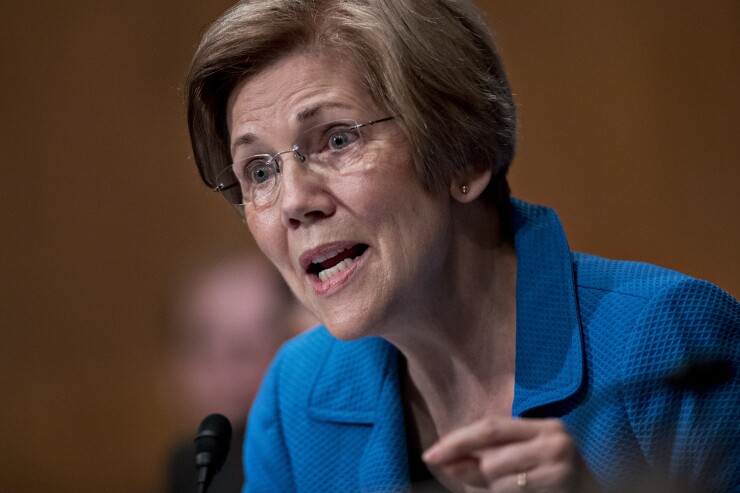WASHINGTON — Lawmakers and a former FBI director sharply criticized bank regulators Tuesday for their enforcement of the Bank Secrecy Act and other anti-money-laundering rules, saying it has become a rote exercise that adds burden to banks but provides little value to law enforcement officials.
The sheer number of anti-money-laundering rules has increased following the 9/11 terror attacks, with examiners focused on the numbers of suspicious activity reports filed rather than assessing the true riskiness of a bank's activities for illicit finance.
“Regulators now have put the banks in a position where they are not necessarily going after that risk or putting metrics in place ... to deal with that high-risk, but they are more in the check the box mentality,” said former FBI Chief Dennis Lormel during a hearing at the Senate Banking Committee.

Even a well-known bank critic, Sen. Elizabeth Warren, D-Mass., said there is room to ease the burden on financial institutions while helping law enforcement.
“We need to do a lot more with our money laundering laws," she said. "I hope that we keep digging into this because I think we might be able to reduce costs for the banks and at the same time help law enforcement do this more efficiently."
Financial institutions use a risk-based approach when allocating resources towards anti-money laundering and illicit finance prevention, focusing more attention on higher risk geographies, transactions and customers.
But Heather Lowe, legal counsel and director of government affairs at Global Financial Integrity, a think tank focused on anti-laundering, said regulators are sometimes loath to embrace the risk-based approach and instead have a one-size-fits-all mentality.
“That shift needs to happen and it will be a big one,” said Lowe.
Greg Baer, president of The Clearing House Association, said that the majority of banks use only a handful of vendors that provide compliance software, and examiners are sometimes critical if a program isn’t generating enough suspicious activity alerts.
However, each alert is labor intensive and Baer said less than 10% of the suspicious activity reports filed by banks are actually reviewed by law enforcement. “That is a massive resource drain,” he said.
But he didn’t pin the blame on regulators. “From a political and personal risk perspective, they are in a no-win situation,” Baer said.
Lawmakers on the panel sought ways to improve the law to avoid the pitfalls of the current system.
“There has got to be some way we can move this away from the rules, check-the-box approach,” said Sen. Mark Warner, D-Va.
Chairman Mike Crapo, R-Idaho, said that “it is incumbent on this committee … to ensure that all of this work and the resources involved result in a ‘high degree of usefulness,’ in protecting this nation, as intended by the BSA itself.”
Baer suggested that rather than have banks file SARs, banks could simply hand over the raw transaction data, which law enforcement could then mine.
Another fix that is being explored would require states to collect beneficial ownership information on companies when they are incorporated. That information would be stored at the Financial Crimes Enforcement Network and could be accessed by law enforcement and financial institutions.
Under a Treasury customer due diligence rule that will go into effect in May, banks will be required to identify and verify the "real people" behind the company that own at least 25% of the company and the people that control it. Financial institutions say that having a registry would assist in that effort.
Lowe said she supported the proposal that would require companies to register beneficial ownership when incorporating, but said the Treasury rule has flaws.
“We have a problem actually with the current customer due diligence rule that was adopted for banks, where the definition is actually not sufficient,” said Lowe. “If you have, or create, five people to own 20% of a business, you would get away with not listing anybody as your beneficial owner, which is really not acceptable. It's incredibly easy to get around.”





